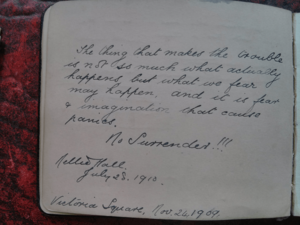Nellie Hall facts for kids
Quick facts for kids
Nellie Hall
|
|
|---|---|
| Born | 1895 Eccles, Lancashire, England
|
| Died | 26 July 1976 Cobourg, Ontario, Canada
|
| Other names | Nell Hall, Nellie Hall-Humpherson, Nell Humpherson, "Marie Roberts" (pseudonym) |
| Parent(s) | Leonard Hall |
| Relatives | Spencer Timothy Hall (grandfather) |
Nellie Hall (born 1895 – died 1976), also known as Nell Hall-Humpherson, was a brave British woman who fought for women's right to vote. She was a suffragette and was arrested many times for her work with the Women's Social and Political Union (WSPU).
Growing Up
Nellie Hall was born in Eccles, England. Her father, Leonard Hall, was a writer who was involved in politics. Her mother was also a suffragette and helped start the Women's Social and Political Union in 1903. Nellie's grandfather, Spencer Timothy Hall, was a doctor and writer.
Nellie grew up in a home where important people like Emmeline Pankhurst and George Bernard Shaw often visited. This meant she heard many interesting discussions about politics and culture. She started her own political work at age 14 in 1909. She joined protests outside Winson Green Prison to speak out against the force-feeding of suffragette prisoners.
Fighting for the Vote
Nellie Hall worked for the WSPU in Birmingham from 1911 to 1913. She was arrested on July 21, 1913, for breaking a window of Prime Minister H. H. Asquith's car. She was sent to prison for three weeks.
The WSPU gave her a special Hunger Strike Medal for her bravery. She was released after eight days because she became ill with mumps.
After this, Nellie moved to London and continued her work secretly. She pretended to be a housemaid and used the name "Marie Roberts." In 1914, she was arrested again with her mother and sister. They were accused of planning protests and hiding tools for breaking windows.
When she was taken from court, Nellie waved to her supporters. She shouted, "It doesn't matter; we shall go on fighting, fighting, fighting!" She was sentenced to three months in prison. There, she went on a hunger strike and was force-fed. She later wrote a small book about her experiences in prison, using her secret name "Marie Roberts."
During the First World War, Nellie moved back to Birmingham. She worked for the Post Office and became the first person to sort mail for the British soldiers fighting overseas. In 1928, she helped care for Emmeline Pankhurst during her final illness. Nellie also carried the WSPU flag at Pankhurst's funeral.
Later Life
In 1920, Nellie Hall married Herbert Humpherson, who was a schoolmaster. They lived in Warwickshire and had two sons, David and Peter.
After Emmeline Pankhurst passed away, Nellie and her family moved to Canada in 1929. She lived in Nova Scotia and Toronto. During World War II, she was the president of the Soldiers' Wives Association. She was also a lifelong member of the Association of Women Electors in Toronto.
In 1962, Nellie appeared as a mystery guest on a Canadian TV show called Front Page Challenge. In 1965, she gave interviews to newspapers about her time as a suffragette. She was interviewed again on Canadian television in 1971 by Pierre Berton. Nellie Hall-Humpherson passed away in 1976 at the age of 83 in Cobourg, Ontario.
 | James Van Der Zee |
 | Alma Thomas |
 | Ellis Wilson |
 | Margaret Taylor-Burroughs |


